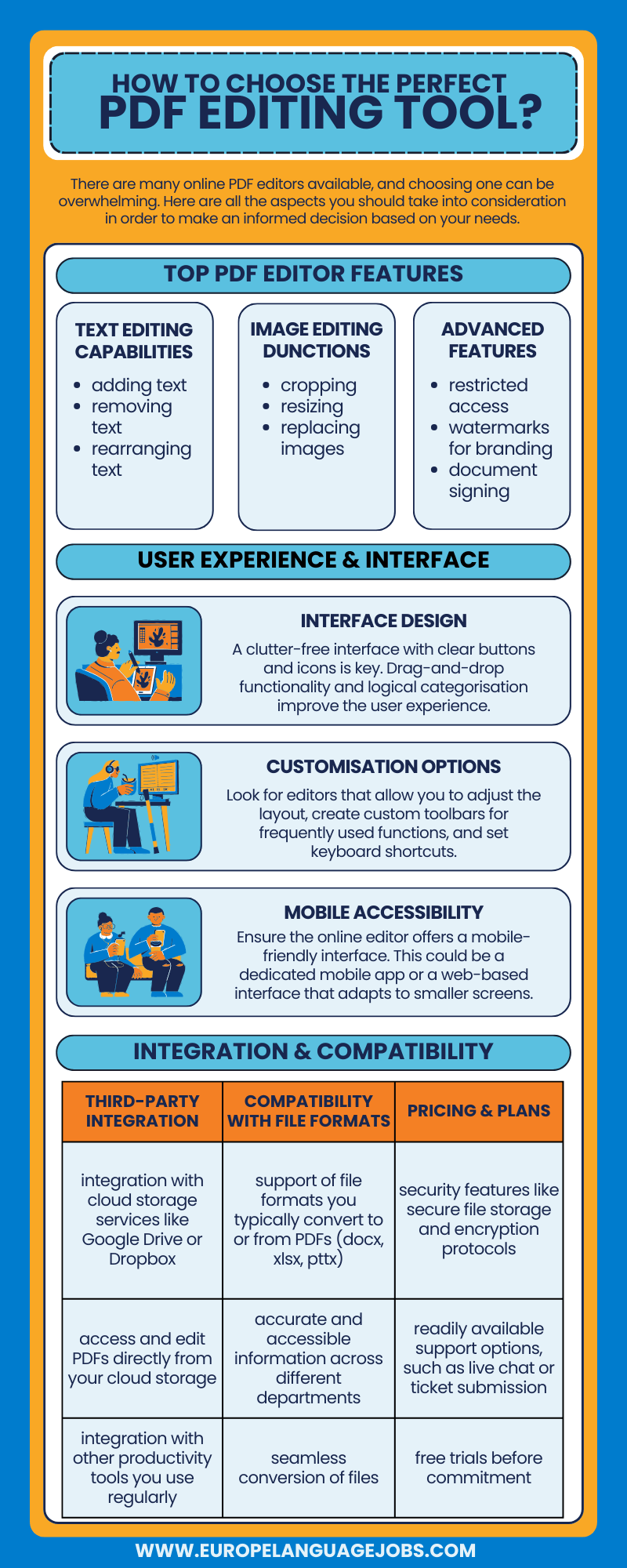Modern PDFs offer a reliable way of sharing documents while preserving their layout and formatting. But sometimes, the need to edit these files arises. This guide contains everything you need to know in order to make an informed decision as to what editor to choose, ensuring that it empowers, not hinders, your productivity and operational activity.


Feature comparison of different PDF editors
The first step is understanding the functionalities offered by online PDF editors. Here are the key features to consider.
Text editing capabilities
Basic editors allow for minor text edits like fixing typos and adjusting formatting. Advanced tools enable comprehensive editing, including adding, deleting, and rearranging text. Optical Character Recognition (OCR) becomes crucial if your PDF originates from a scanned document, converting scanned text into editable characters — a lifesaver for documents requiring significant edits.
Imagine you’re an educator tasked with updating course materials originally received as scanned PDFs. An editor with robust OCR allows you to convert the scanned text into an editable format, making revisions to the curriculum a breeze.
Image editing functions
Editing images within PDFs can involve tasks like cropping, resizing, and replacing them. Advanced editors might offer features like image compression to reduce file size and brightness/contrast adjustments for clarity.
For instance, a real estate agent might use an online PDF editor to update property brochures. The ability to crop and resize high-resolution property photos within the PDF ensures a visually appealing presentation while keeping the file size manageable for easy online sharing with potential buyers.
Advanced features
Look for options like password protection to restrict access, adding watermarks for branding, and document signing capabilities for a smooth digital signature workflow. A great PDF editor allows for form creation as well, which makes it ideal for collecting information online.
Human resources departments can leverage advanced features like document signing to streamline the onboarding process. Employees can electronically sign essential documents like NDAs and benefits enrollment forms, saving time and paper.

Comparison of PDF editors by user interface and experience
An intuitive, user-centric interface is central to a smooth editing experience. Here’s what to consider.
Interface design
A clean and clutter-free interface, with clear buttons and icons, is key. Editors that categorize tools logically and offer drag-and-drop functionality for ease of use are preferable.
Customization options
The ability to personalize your workspace can significantly enhance efficiency. Look for editors that allow you to adjust the layout, create custom toolbars for frequently used functions, and set keyboard shortcuts for a streamlined workflow.
Mobile accessibility
If you require on-the-go editing, ensure the online editor offers a mobile-friendly interface. This could be a dedicated mobile app or a web-based interface that adapts to smaller screens. In today’s mobile-centric world, the ability to edit PDFs online is increasingly important.
Imagine a sales representative needing to revise a proposal while traveling to meet a client. A mobile-friendly editor, like Lumin’s, for example, allows for quick edits and last-minute adjustments, ensuring a polished presentation during the meeting.
Integration and compatibility: Choose the best PDF editor for your needs
Beyond core editing features and user experience, consider how the online PDF editor integrates with your existing workflow and the types of files you handle.
Third-party integration
Does the editor integrate with cloud storage services like Google Drive or Dropbox? This allows you to access and edit PDFs directly from your cloud storage, eliminating the need for downloading and uploading files. Integration with other productivity tools you use regularly, like project management software or email clients, can further streamline your workflow.
For instance, a marketing team collaborating on a new campaign can leverage an editor with real-time co-editing features and cloud storage integration. This allows team members to work on the same PDF simultaneously, streamlining feedback and approval processes and ensuring everyone is on the same page (literally!).
Compatibility with file formats
Ensure the editor supports not only PDFs but also the file formats you typically convert to or from PDFs. Common conversions include Microsoft Word documents (docx), spreadsheets (xlsx), and presentations (pptx).
In the healthcare industry, patient charts and reports are often shared in PDF format. An online PDF editor with strong compatibility with Microsoft Word documents allows medical professionals to seamlessly convert reports back and forth for edits without layout issues. This ensures patient information remains accurate and accessible across different departments.
Pricing and plans
Online PDF editors offer a range of pricing options, from free versions with limited features to subscription plans with advanced functionalities. Consider your editing needs and usage frequency. Free options might suffice for occasional, basic edits. If you require regular editing with advanced features, a paid subscription might be a worthwhile investment.
Here are some additional tips to keep in mind when selecting an online PDF editor:
-
Since PDFs often contain sensitive information, prioritize editors with robust security features like secure file storage and encryption protocols. Look for editors that comply with industry-standard security regulations relevant to your field, such as SOC 2 or GDPR, for handling highly confidential data.
-
Reliable customer support is crucial for troubleshooting any issues that might arise during editing. Look for editors with readily available support options, such as live chat or ticket submission, and knowledgeable representatives who can assist you efficiently.
-
Many online PDF editors offer free trials. Utilize these trials to assess the features, interface, and overall editing experience before committing to a paid plan. Pay close attention to how intuitive the editor feels and how well it caters to your specific workflow.
By carefully evaluating these factors, you’ll be well-equipped to select an easy-to-use online PDF editor that integrates with your workflow, meets your specific needs, offers a user-friendly editing experience, and empowers your team members with real-time collaborative tools.
Remember, the “best” editor depends on your unique requirements. There’s no one-size-fits-all solution, so explore different free trial options to find your perfect online PDF editing tool.








Mitra Kermanian1y ago
Good effort to announce people about possibility to grow in the society.
Good effort to announce people about possibility to grow in the society.